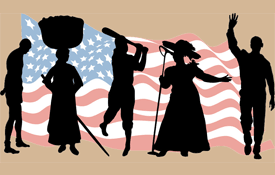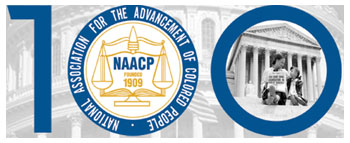0 100 Years of the NAACP 1909 – 2009
- History
- by Hugh Smith
- 02/03/2009

 The birthday party will last one year, and it starts on Thursday, February 12, 2009.
The birthday party will last one year, and it starts on Thursday, February 12, 2009.
1,700 chapters across the USA will celebrate the 100th anniversary of the NAACP through February 12, 2010.
Here is the official NAACP 1909 - 2009 timeline prepared by the National Associated for the Advancement of Colored People.
A century of tenure is behind their 100 year advocacy as a leader in the fight for civil rights, dignity, and equality.
Check out our own BlackHistoryPeople.com timeline featuring 15 NAACP facts (from Empower Encyclopedia):
- W.E.B. Du Bois was a co-founder of the NAACP in 1909.
- James Weldon Johnson, (1871-1938), wrote the famous poem, "Lift Every Voice and Sing" - now known as the Negro National Anthem. He joined the NAACP in 1916, and became Executive Secretary of the organization in 1920.
- Mary McLeod Bethune (1875 - 1955) was a champion for education, civil rights, and women's rights. She worked closely with the NAACP, and founded the National Council of Negro Women in 1935.
- An activist for civil rights and education, Daisy Bates co-founded Arkansas' State-Press Newspaper. In 1953, she was elected President of the Arkansas Conference of NAACP branches.
- Dr. Joel E. Spingarn introduced the Spingarn Gold Medal in 1914 while he was Chairman of the Board of the NAACP. The Spingarn award represented the highest of African American achievement, (similar to the NAACP Image Awards today).
- Attorney Constance Baker Motley, (1921 - 2005), started her brilliant civil rights career with the NAACP Legal Defense Fund in 1945 as a law clerk.
- Daisy Lampkin, (1883-1965), increased the visibility and membership of the NAACP through her fund raising leadership. She was involved in Pennsylvania State politics (1928) becoming the first African American woman from the commonwealth elected as a delegate at large to the GOP convention. Lampkin began her career with the NAACP in 1929, serving the organization in numerous leadership roles.
- Thurgood Marshall, (1908-1993), became assistant special counsel for the NAACP in 1936, then chief counsel in 1938.
- Dr. Martin Luther King Jr., (1929 - 1968), organized the Montgomery bus boycott with Rev. Ralph David Abernathy and the NAACP in 1955 after Rosa Parks refused to surrender her bus seat to whites.
- In the 1960's Vernon E. Jordan Jr. was quite involved with civil rights as Field Secretary for Georgia's NAACP.
- Margaret Bush Wilson was elected Chairman of the Board of the NAACP in 1975.
- Benjamin L. Hooks, in 1977, succeeded Roy Wilkins to become Executive Director of the nation's top civil rights organization, the NAACP.
- Kweisi Mfume entered the U.S. House of Representatives in 1987. He served until the end of the 104th Congress. After Congress, Mfume accepted the position of President and CEO of the NAACP.
- An outspoken critic of offensive lyrics by music industry artists, Philadelphia native C. Delores Tucker, (1927 - 2005), served as Vice President of the Pennsylvania NAACP.
- Dr. Fredda Witherspoon, Ph.D., was President of the Missouri NAACP.